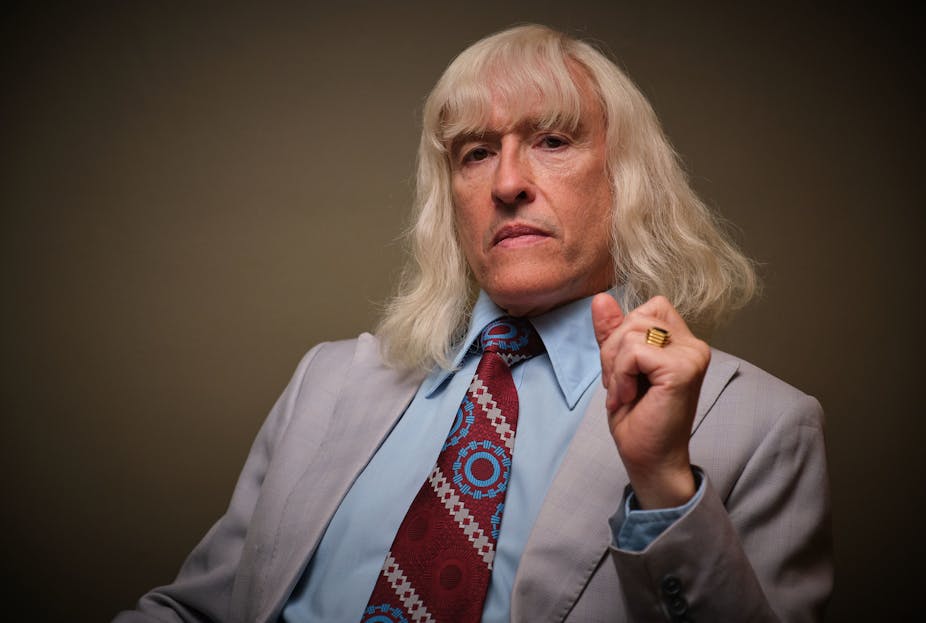Steve Coogan portrays Jimmy Savile in the new BBC mini-series The Reckoning. This much anticipated and debated show is the most recent – and perhaps most contentious – in a long line of programmes “based on real events”, that focus on harrowing stories of abuse or murder.
In recent years alone, David Tennant played Scottish serial killer Dennis Nilsen in the ITV series Des (2020); Stephen Merchant played British serial killer and rapist Stephen Port in the BBC drama Four Lives (2022) and Olivia Colman and David Thewlis portrayed the convicted murderers Christopher and Susan Edwards in the BBC series Landscapers (2021).
The trend is a testament to the public appetite for dramas based on true crime. But how do actors approach such work? And how is portraying a real person different from playing a fictional role?
When actors play real people – particularly those involved in complex and disturbing events – they often find themselves at the centre of debates about the project. Should the programme be made? Is this a legitimate person to depict?
This debate is perhaps loudest when both the actor and the subject are famous. We know Coogan (and the characters he plays) and we know Savile (how he looked, how he spoke and, more recently, what he did).
Many people have denounced the BBC’s decision to make a drama out of their own failings to stop the serial abuser and rapist. But how do actors navigate these questions? Do such debates about the subject affect their work?
My research
Over the past 15 years, I’ve interviewed more than 50 actors about their portrayals of real people. Never before have I heard such public interest and concern about a depiction – or seen an actor’s sense of the challenge so keenly felt.
I’ve interviewed actors playing notorious leaders such as Adolf Hitler and Robert Mugabe, people involved in terrorist organisations, and even the people who gave evidence at the recent Grenfell Tower inquiry and were held responsible for that terrible fire. But none of these actors spoke of the challenge in the way that Coogan has done.
Two days before the show aired, he told the BBC: “I knew there was the potential for catastrophic failure if you get it wrong, but that’s not a reason not to do it.”
In other interviews, Coogan has balanced the attractiveness of the role with the sense of responsibility he felt in taking it on. He explained: “As an acting job, it’s what all actors want to play. Whatever your views on him, [Savile’s] a fascinating, although horrific … figure.”
But he was also aware of the public concern, which felt more personal: “People play Hitler or serial murderers and no one bats an eyelid, but there’s a lot of consternation about me doing this.”
Concerns over casting
Some of these concerns may be down to Coogan’s association with comic roles and impressions. Many actors I have interviewed are eager to distance themselves from impersonation.
Actors in the 2007 documentary play Called to Account, about the legitimacy of the war in Iraq, told me that: “The most important thing is you don’t imitate.” Ian McKellen similarly distanced himself from notions of impersonation when portraying Hitler in Countdown to War (1989). But why?
The processes that actors described to me often focused on recreating their subject’s verbal idiosyncrasies and physical appearance. For our book Playing For Real (2010), Mary Luckhurst and I interviewed Roger Allam, who played Hitler in the Royal Shakespeare Company’s production of Albert Speer (2000). He told us:
I found photographs helpful. There was one taken at Hitler’s mountain residence in Berchtesgaden where he was slumped far down in a chair, and I stole that posture for a moment in the play. You steal everything that is usable, really.
When it came to physical likeness, Allam recalled: “Being able to look in the mirror and think, yes, that passes for Hitler. That’s very, very important.”
What, then, is the distinction between acting and impersonation? I’d suggest that it is the comic connotations of the terms “mimicry” and “impersonation” or “doing an impression” that actors are at pains to avoid, rather than a particular approach.
There is also a snobbery about impersonation, perhaps viewed as a less noble art than acting. It seems likely that Coogan’s profile as both an actor and comic contributed to the questions raised ahead of his portrayal of Savile.
Rethinking ‘impersonation’
Coogan’s portrayal has, deservedly, been widely admired – despite significant reservations about the drama and the way that the BBC’s shortcomings were handled.

The praise has often returned to this question of impersonation and acting. Guardian journalist Lucy Mangan focused on these terms when she wrote: “He is a fine actor as well as a fine impressionist, and the part of Savile gives him the chance to blend the two in perfect proportions.” And the Financial Times noted that by “transcending impersonation, he reveals the depths of grotesque depravity”.
Here is the other side of the coin. Though playing notorious real people might place actors at the heart of complex debates about legitimacy and representation – and come with a great weight of responsibility – actors’ portrayals of such people are often highly admired.
Six of the last ten best-actor Oscars and three of the last ten best-actress Oscars have gone to actors playing real people. Arguably, this is due to the fact that playing a real person makes the actor’s skill more measurable. We see Coogan and we see Savile – the hidden craft of acting becomes tangible when we can compare the two.

Looking for something good? Cut through the noise with a carefully curated selection of the latest releases, live events and exhibitions, straight to your inbox every fortnight, on Fridays. Sign up here.

